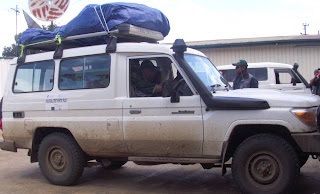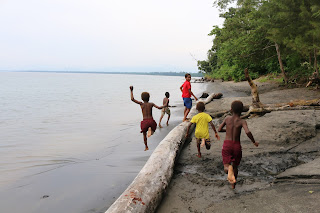PART VII
Forest
Authority involved in PNG climate change issues from day one
by
Fay Duega
Public
Relations Officer, PNGFA
As part of my participation
in the four-day media training in April 2019 organized by the PNG REDD+
Programme led by Climate Change Development Authority (CCDA) with support from
the Forest Carbon Partnership Facility (FCPF) Project/UNDP (United Nations
Development Programme), I was tasked to write about how my employer the Papua
New Guinea Forest Authority (PNGFA) is involved in the climate change and REDD+
activities of Papua New Guinea, hence this write up.
PNGFA has been involved in
this subject matter from the very beginning. Below is my interview with Mr.
Goodwill Amos, PNGFA Manager for REDD and Climate Change, who was part of the
PNG delegation to the Eleventh Session of the Conference of the Parties (COP11)
in Montreal, Canada in 2005 where Reducing Emissions from Deforestation in
Developing Countries: Approaches to Stimulate Action (REDDCASA) was introduced
for the very first time.
Amos, a strong
practising Christian said that God was present in the lead up and during the
introduction of this proposed agenda in the COP11 meeting in Montreal, Canada
in 2005.
“Initially, I didn’t know what RED or REDD+ was all about. “I had attended a funeral service in Pari village, Central province for one of my nieces and was driving back when I received a phone call from a staff of Dr. Wari Iamo, the then Secretary for the then Department of Environment and Conservation (DEC). It was a Wednesday and they told me that I was flying on Saturday to New York and onto Montreal to put this REDDCASA initiative on the agenda.
“After I hung up, just thinking about the long distance, I prayed in the car, saying, Lord I don’t want to waste my time to fly all the way to New York and onto Montreal to put this agenda up, but if it’s your will, then please give me signs that all will go well. Give me window seats on the flights from Port Moresby all the way to Canada.
“That was Friday and I successfully got my American visa and organized my TA within two days, which I saw as God being in charge and taking control of the situation.
“The next sign for all to
go well at the COP11 for me, was for the Lord to give me window seats all the
way.
“On Saturday, for my flight from Jackson’s Airport, Port Moresby to Brisbane, Australia, I didn’t ask for a window seat. I left it in the Lord’s hands to direct the traffic officers. When I got on the plane and looked at my ticket, it was a window seat. I wasn’t excited. In Brisbane we changed planes for the trip to Sydney and I was given another window seat. From Sydney to Los Angeles (LA), a window seat as well. I wasn’t excited. From LA to New York, another window seat.
“The next day was the presentation of the proposed REDDCASA agenda at the PNG Embassy in New York. That was my first time to hear about this subject matter. RED and REDD+ did not come up until after the REDDCASA agenda was accepted at COP11. The presentation was done by PNG’s chief negotiator Kevin Conrad to Pacific Island countries also interested in this matter. Kevin spoke about how forests in developing countries like PNG will be kept to absorb carbon for developed countries who will then compensate us. After the presentation, I asked Kevin if he consulted our people and he responded that he consulted the government only. I then explained to him that the forests in PNG belong to the people so they need to be consulted. His response was: this was something that was moving very fast so he had to work with the government.
“However, I take my hat off to Grand Chief Sir Michael Somare who was the Prime Minister then. He made this work possible because at various meetings all over the world that he attended and spoke at, including the Pacific Islands Forum and Commonwealth Heads of Government Meetings (CHOGMs), he always promoted this initiative.
“The PNG delegation to COP11 was headed by the then Minister for Environment and Conservation William Duma. The others included Dr Wari Iamo, Dr. Gunther Joku, the current Managing Director of Conservation and Environment Protection Authority, formerly the DEC, Bob Tate from the Forest Industries Association and officers from the PNG Embassy in New York, amongst others.
“The next day, we flew from New York to Montreal, Canada for the three-week COP11 meeting which was held from November 28-December 9th, 2005. This time I was really excited to see where I would sit and again, I was given a window seat. The flight from New York to Montreal is about 30-45 minutes and I was so happy. I knew that this agenda would go through so in the plane I was punching the air saying, God you are too good. This is going to be a goer. When we arrived in Montreal, that’s where the actions started - the negotiations. The first two weeks were very hectic as we had to negotiate with like-minded parties.
“Two parties are needed for any agenda to progress further. In the first week, parties were turning us away. We asked Australia, Brazil and Bolivia to partner with us to put forward the REDDCASA agenda, but they all refused. It would take just one party out of the 194 parties (now increased to 197) present to disagree and the agenda would be thrown out. Costa Rica however agreed to partner PNG on this REDDCASA agenda and the proposed agenda became known as from PNG/Costa Rica.
“Parties refused to be part of the PNG agenda because they thought it would be knocked off. This was because previously, under the Kyoto Protocol, they were using Clean Development Mechanism (CDM) which looked at reafforestation and reforestation which dealt with plantation forests. Here PNG and Costa Rica - countries with forests were involving natural forests. We were saying, you can look at reafforestation and afforestation from plantation forests but we have this big natural forest absorbing carbon that should also be considered. However, people had their own views saying technically, it would be difficult to monitor all these things so they did not want to go down that path - until PNG and Costa Rica decided to put up the REDDCASA agenda at COP11.
“While big nations paid US$10,000 and had big offices with great facilities, PNG couldn’t afford such an office. However, I chose a remote place within the meeting venue which had everything at no extra cost. It was like God appointed the place for PNG. We didn’t have all those facilities but we had coffee, fruits and a nice big open space in a remote location, well placed to conduct meetings.
“The other members of the delegation were doing other stuff while Kevin and I concentrated on the negotiations. In the second week, Kevin asked me to go look for America’s chief negotiator. I walked out, went to a corner where he could not see me and prayed, saying: “Father, I am looking for the chief negotiator for the Americans, wherever he is, send him to me. The next minute, he came saying, PNG, I’m looking for you. And I replied, America, I’m looking for you too. I took him to Kevin who spoke to him on our behalf.
“After the chief negotiators of America, Australia and Tuvalu left, Kevin asked, Mr. Amos, how did you bring these guys in record time? I said, you Americans have the latest laptops, latest mobile phones, latest everything, I use the one that has been there before time began – prayer. I just asked, and the Lord brought them to me. Kevin’s parents used to be missionaries in Wewak, East Sepik province so he understood.
“All the parties were against the PNG/Costa Rica agenda in the first week so as part of the negotiations, Kevin reminded them that at this specific meeting on this date, your prime minister/president agreed to this agenda. They then called home and got confirmation of what Kevin had told them. As a result of this, in the second week, different parties became our allies.
“One thing I liked about Kevin is, he’s a very good negotiator. That helped us to pull this through. He knew who to talk to and how to talk to them to get them on our side. The major players, the Americans and Australians were now on our side. Tuvalu, the tiniest of all nations, was also on our side.
“We had to talk to Tuvalu because it was initially against our agenda. We negotiated with Tuvalu to support our agenda in exchange for our support for their adaptation agenda. Tuvalu was talking adaptation while PNG was more into mitigation, both to do with reducing emissions.
“The third and final week we were ready to put up the REDDCASA agenda. It was the only agenda we were trying to push through with regards to mitigation. Other things were going on but this agenda with its negotiations were really hot.
“The place was packed with 10,000 plus delegates in their allocated party/nation spots. We were sitting behind Minister Duma. Then the Canadian Prime Minister Paul Martin who was the chair of the COP11 began to introduce the proposed agenda. It was like God was present in the meeting venue. Ours was the only agenda so after the chairman introduced it, he looked around to see if any party would disagree by putting up their flag. Just one flag up will see it thrown out. It was like God held the hands of all the parties and everybody just froze. If somebody had dropped a pin, you would have heard it.
“We are now in the 14th year since the introduction of the agenda in 2005. From RED with the single ‘D’ standing for deforestation, the Africans added the second ‘D’ which stands for forest ‘Degradation’, taking into account their many logging operations.
“The plus (+) is for conservation, enhancement of carbon stock to do with afforestation, reforestation, and sustainable forest management.
“PNGFA has been involved in climate change from the start. However, because of the Climate Change Management Act, the responsibility has been transferred to Climate Change Development Authority. PNGFA however still has a part to play because REDD+ is all about forests. CCDA is PNG’s mouthpiece on climate change issues and deals with policy issues while the action bit is done by PNGFA.
The PNGFA has a REDD and Climate Change Branch and many of the issues in addressing the effects of climate change and responding to international communique are undertaken by PNGFA. CCDA seeks the input of bodies such as PNGFA, and others where required.
The Conference of the Parties is the supreme body of the United Nations Framework Convention on Climate Change. COP 11/CMP1 was the first COP that served as the Meeting of the Parties to the Kyoto Protocol (CMP1) since their initial meeting in Kyoto in 1997. The event marked the entry into force of the Kyoto Protocol. COP11 came up with the Montreal Action Plan which is an agreement to extend the life of the Kyoto Protocol beyond its 2012 expiration date and negotiate deeper cuts in greenhouse gas emissions.
REDD+ is enshrined under Article 5 of the Paris Agreement which PNG
ratified in 2016.

















